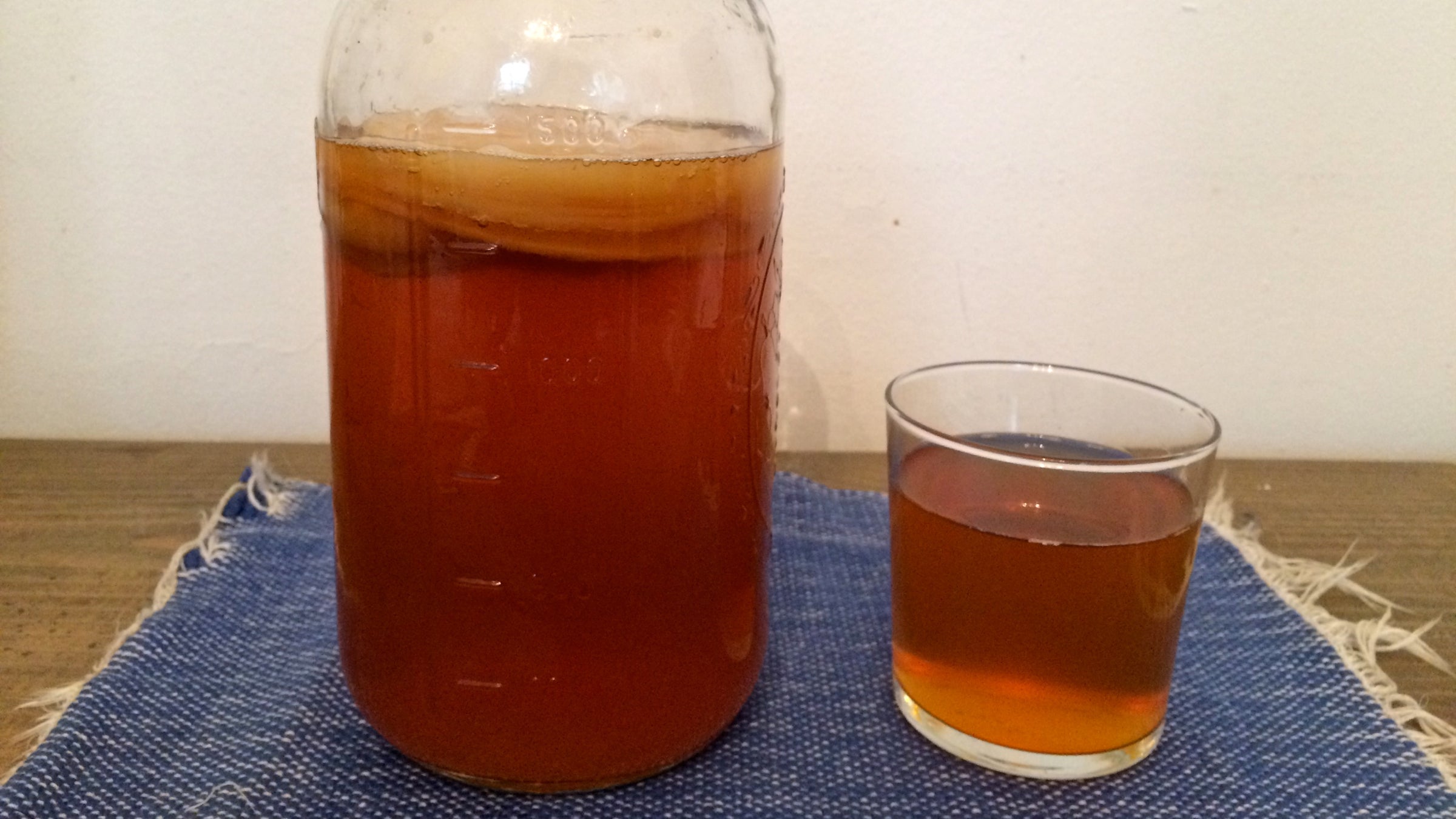Happiness in a bottle, just add SCOBY
Listen
In the past 20 years kombucha has exploded in popularity. (Shaina Gates/WHYY)
Kombucha’s lack of science doesn’t deter its proponents.
For seven years, Amanda Feifer worked in food marketing, helping big companies figure out ways to better hawk their products.
Then she up and quit.
“And now I’m surrounded by jars and I do everything the slowest way possible, and the least shelf-stable way possible. So I really did kind of flip the switch on that,” she says with a laugh.
Feifer writes the food blog Phickle.com, and soon a book on do-it-yourself vegetable fermentation.
So as you’d expect, her South Philly row home is full of things aging in glass containers, including kombucha.
“It is not the most beautiful thing in the universe, as you can see,” she says, pulling down a gallon of brownish-red liquid.
Floating at the top is the key ingredient for kombucha fermentation: the mushroom-looking SCOBY.
“The SCOBY is a disgusting, gelatinous blob that looks like a weird alien that you would not want anywhere near your food,” says Feifer. “But it makes something taste really good so we put up with it.”
The bacteria and yeast that make up the frisbee-shaped SCOBY feed off a combination of steeped tea and sugar, over time producing a slightly sweet, slightly sour drink with a little alcohol kick.
Formerly the stuff of hippies, kombucha has exploded in the past two decades, in no small part because of its rumored health benefits.
Feifer says the Internet is full of exactly the type of miracles you’d expect to read on the internet.
“People claim things as far reaching as it cured cancer, to ‘it made my gray hair go away,’ to ‘I no longer have wrinkles.’ And I think that if that was really the case for everybody, if that was replicable, then nobody would have wrinkles or gray hair or cancer anymore.”
Feifer herself turns to it whenever she feels a cold coming on, and says it’s great for hangovers, but she’s also quick to point out that there’s no medical literature supporting kombucha’s curative powers.
“There are no studies in humans,” says Dr. Larry Bergstrom, a physician at the Mayo Clinic in Scottsdale, Arizona. “There are some studies in animals…and I think there’s enough evidence that they need to continue to do research. But not enough that you can recommend this on the science.”
That hasn’t stopped commercial producers, though, from advertising it as a health drink, claiming “high nutritional value” and “powerful antioxidant” properties, all in a natural beverage.
“There are many people who believe that if you can get a beneficial drug effect from a food, that that’s preferable to getting it from a pill,” says Marcia Pelchat, a food researcher at the Monell Chemical Senses Center in West Philadelphia.
She says there’s a long history of food fads based on sometimes true, sometimes less-than-true claims, including gluten-free products, oat bran, and even 19th-century Graham Crackers.
“Ah yes, Graham Crackers,” says Pelchat. “They started out as a fad…it was more related to a moral issue. It was supposed to prevent people from engaging in self-abuse,” the sin otherwise known as masturbation.
Reverend Graham was on a mission to calm teenage boys down a bit with unsweetened wheat bran.
The current excitement over kombucha is part of a larger trend; a movement back in time toward whole, natural foods with ingredients we recognize, according to Sandor Katz. He’s a hero in the fermentation world and author of the New York Times bestseller The Art of Fermentation.
“There’s just a renewed interest in food,” says Katz. “Where does our food come from? How has it been grown, and prepared? And people are wanting to become more involved with that. And once you start asking those kinds of questions, and interrogating your food, well, fermentation is part of the answer.”
Research does show that, broadly speaking, fermented foods like sauerkraut, pickles and yogurt do contain bacteria that’s good for our gut. Kombucha may be the poster child right now, but it’s probably not the best of the fermented bunch, at least in isolation.
And while there have been worries over people made sick by home-brewed versions, Amanda Feifer offers this advice for those still curious.
“My rule of thumb is always: drink it, it is not going to hurt you. Have a cup of it, see how you feel. If it makes you feel better, great. If it doesn’t, stop drinking it. But please don’t take it to cure cancer, and not do anything else,” she says.
Feifer has been producing kombucha using the same lineage of SCOBY for five years, and expects to be cranking out teas with it for another 50, long after the fad fades.
“I don’t have any plans to let my SCOBY die out. I plan on giving it to my grandkids.”
WHYY is your source for fact-based, in-depth journalism and information. As a nonprofit organization, we rely on financial support from readers like you. Please give today.



